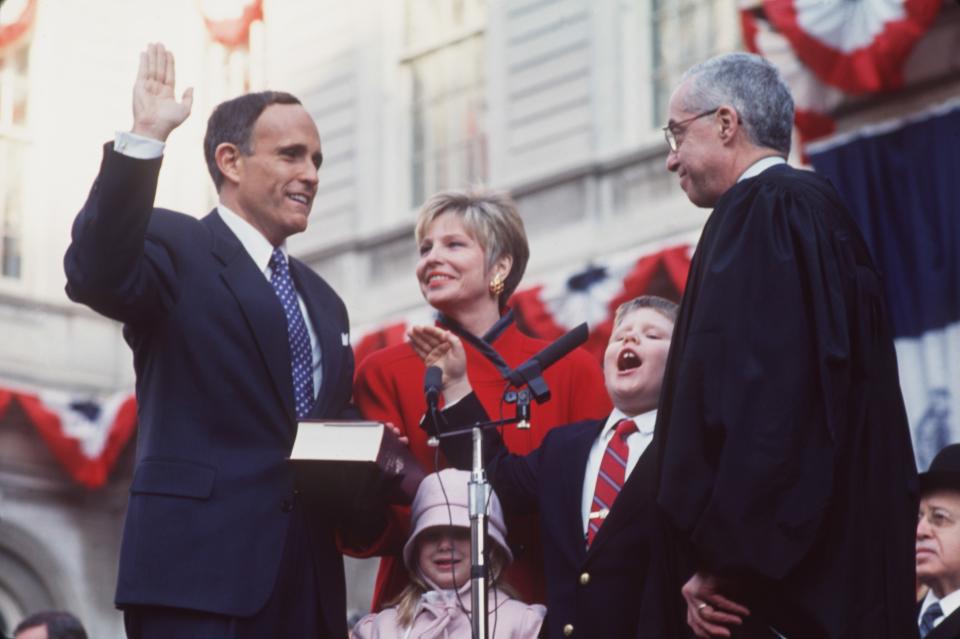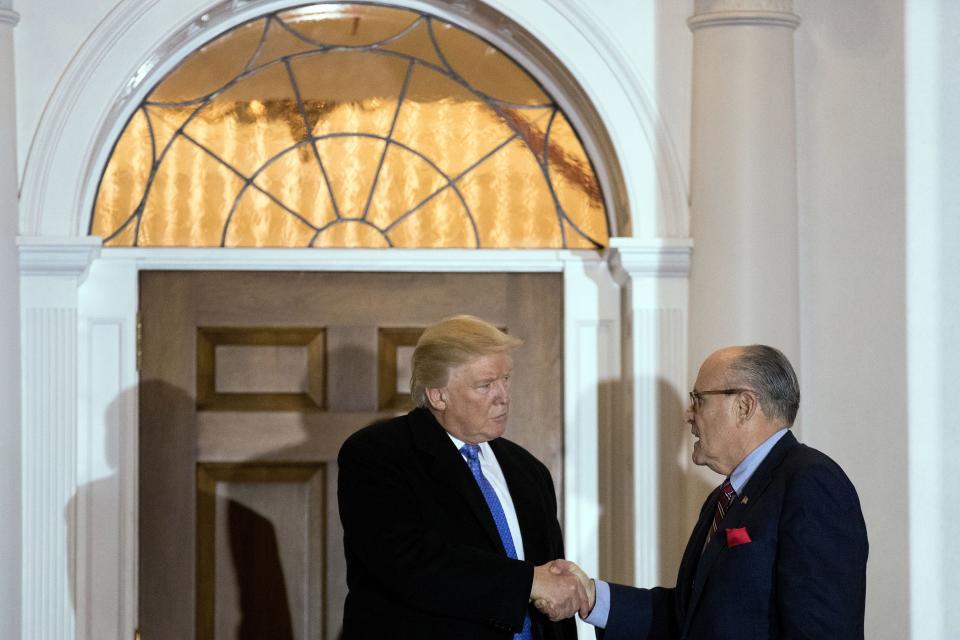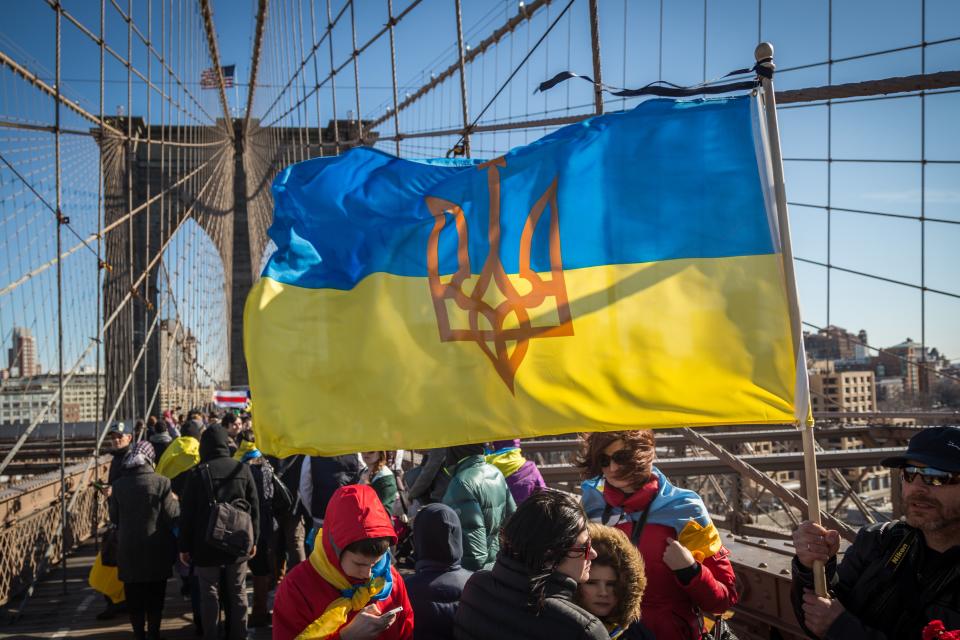The Decline and Fall of Rudy Giuliani
Eighteen months ago, with Robert Mueller’s investigation into the 2016 election in full swing, Donald Trump hired former New York City mayor Rudy Giuliani to serve as his personal attorney. The president made this choice, presumably, for three reasons. First, Giuliani is a famous Republican lawyer whom Trump knew well. Second, Giuliani was very, very available. Finally, and perhaps most importantly, no other lawyers of note wanted the job. Trump settled on his counsel for the most important legal fight of his life almost by process of elimination.
His task, Giuliani said at the time, was to bring Mueller’s work to a “resolution,” and he predicted he’d need “a week or two” to do it. “I’m going to ask Mueller, ‘What do you need to wrap it up?’ ” he told the New York Post. In fact, the probe would not end for another year after that.
Since then, Giuliani has gone from defending a client under investigation to being the subject of an investigation himself. As The New York Times reports, federal prosecutors in Manhattan are looking at his involvement in Trump’s decision to recall Marie Yovanovitch, the former U.S. ambassador to Ukraine, earlier this year. According to The Wall Street Journal, Giuliani did so because Yovanovitch was interfering with his behind-the-scenes campaign to persuade Ukraine to investigate Trump’s potential 2020 challenger, former vice president Joe Biden—the scandal that prompted House Democrats to open an impeachment inquiry last month.
Giuliani, for his part, denies any wrongdoing and says that he was representing Trump's interests throughout his Ukraine-related dealings—an assertion lawmakers will undoubtedly want to know more about in the months to come. (Upon learning of Giuliani's misadventures in amateur diplomacy, then national security adviser John Bolton reportedly described him as a “hand grenade who’s going to blow everybody up.”) In the meantime, every time Giuliani goes on cable news, he seemingly manages to grow visibly more confused while also making things worse for everyone in his orbit.
Ironically, Giuliani first rose to fame within the same outfit now investigating him—the office of the U.S. Attorney for the Southern District of New York, which President Ronald Reagan appointed him to lead in 1983. He parlayed his reputation as a hard-charging, mob-busting prosecutor into eight years as mayor of New York City. On September 11, 2001, the attacks on the World Trade Center changed his political fortunes forever. Like a wartime president, Giuliani saw his approval rating skyrocket to an all-time high of 79 percent, even with only a few months remaining in his term. Oprah bestowed on him the title of “America’s Mayor,” and Time named him its Person of the Year.

After that, Giuliani became a sort of heroic elder statesman of the Republican Party and, as the Bush administration’s War on Terror raged overseas, a solemn reminder for supporters of the reasons for fighting it. In a 2006 poll, he was rated as the nation’s most popular politician of either party. (Illinois senator Barack Obama and Arizona senator John McCain finished second and third, respectively.) But despite a sizable early lead in the polls, his 2008 presidential bid flamed out due to both a series of lingering scandals from his mayoralty and also a general public weariness for his act. “Rudy Giuliani—there’s only three things he mentions in a sentence,” said then senator Joe Biden during a Democratic primary debate. “A noun, and a verb, and 9/11. I mean, there’s nothing else!”
His career in politics seemingly over, Giuliani returned to the private practice of law and busied himself with his work at a security consulting firm, Giuliani Partners, which he founded in 2002. He would not really return to the national scene until 2016, when he became one of the few party-establishment backers of fellow famous New Yorker Donald Trump. “Donald's a very, very good friend,” Giuliani told CNN in April. “I think he'd be the person I would like to see win.” The two shared a lengthy history: While Giuliani was the city’s bombastic mayor, Trump was king of its gossip pages. They went to Yankees games together and attended each other’s third weddings. Giuliani even spoke at the 1999 funeral of Donald’s father, Fred.

For Trump, even the support of a Republican Party C-lister like Giuliani brought credibility to his upstart campaign; for the former mayor, the candidate was his return ticket to cultural relevance. Suddenly, Giuliani was by Trump’s side at packed MAGA rallies, gleefully spouting conspiracy theories about Hillary Clinton’s health on cable news and delivering a fiery keynote speech at the 2016 Republican National Convention.
“I know we can change it because I did it—by changing New York City from the crime capital of America to the safest large city in the United States,” Giuliani declared. “What I did for New York, Donald Trump will do for America!” (Crime did decrease during Giuliani’s tenure, but at the time it was already decreasing both in New York and in other urban areas nationwide. Experts continue to debate why this drop occurred—a booming economy, a larger police force, shifting demographics—but the mayor’s controversial tough-on-crime, clean-up-the-streets ethos was, at the very best, only part of the story.)
Although Trump passed him over for a cabinet position—Giuliani reportedly made the shortlist for Secretary of State—the president kept his old friend around in a hodgepodge of roles, putting him in charge of a cybersecurity working group and seeking his advice on implementing the first iterations of the Muslim ban. When longtime Trump attorney Michael Cohen became the subject of a criminal probe that would eventually land him in prison, Giuliani, already hanging around in the White House’s general vicinity, was a natural candidate to replace him.
Like Cohen, Giuliani became a sort of hybrid lawyer/fixer/crisis manager for Trump, alternately providing advice and enthusiastically defending his client on TV. “Truth isn’t truth,” he told a flabbergasted Chuck Todd in August of last year, explaining how two parties can offer different factual accounts of an event without one of them being wrong and/or a liar. This is not an argument that is likely to succeed in a court of law anytime soon.
It is in his newfound capacity as Trump’s globe-trotting henchman, apparently, that Giuliani became embroiled in the Ukraine mess. During a series of clandestine meetings this summer, he began pushing for recently elected Ukrainian president Volodymyr Zelensky to open an investigation of the Biden family to boost Trump’s chances at re-election. Giuliani’s theory of the case is that as vice president, Joe Biden urged Ukraine to fire its prosecutor general, Viktor Shokin, in order to protect his son, Hunter Biden, who sat on the board of a Ukrainian energy company whose owner was suspected of corruption. The former mayor also wanted the Zelensky administration to look into a long-debunked conspiracy theory that Ukraine, not Russia, was behind the foreign interference in the 2016 U.S. presidential election.
There is no evidence that this version of events is true; in fact, Biden called for Shokin’s ouster because of Shokin’s refusal to do the work of investigating corruption. Giuliani, however, stuck doggedly to his guns, freely rearranging facts, events, and loyalties in order to best suit his preferred narrative. While lobbying Shokin’s successor, Yuriy Lutsenko, to open the aforementioned investigation, Giuliani referred to him as a “much more honest guy” than Shokin, perhaps hoping to curry favor with Lutsenko. When Lutsenko concluded that the Biden family had done no wrong, a frustrated Giuliani changed his mind, asserting that Shokin was the good one all along.
As part of his sleuthing, Giuliani also compiled a dossier of disinformation about the Bidens and Yovanovitch, the then U.S. ambassador to Ukraine, and says he delivered it to Secretary of State Mike Pompeo in March. Pompeo, Giuliani claimed, promised to investigate. When the State Department inspector general handed that file over to Congress, lawmakers were baffled by what it contained. “The whole thing looks rather amateurish to me,” Maryland Democratic congressman Jamie Raskin told NBC News. “It looks like a collection of some newspaper articles that appear to have been coordinated, some e-mails, and then basically a lot of conspiracy theories.”
Although the precise nature of Giuliani’s role in managing American relations with Ukraine was murky to many in the administration, his importance in the process, at least, was not. In a now infamous July call with Zelensky, Trump urged his counterpart to cooperate with his TV lawyer turned hobbyist diplomat as soon as possible, with hundreds of millions of dollars in U.S. foreign aid and a potential invitation to the White House hanging in the balance. “Mr. Giuliani is a highly respected man,” the president said, according to the White House’s notes of the conversation. “I will tell Rudy and Attorney General [William] Barr to call.”
Last month, when a whistleblower complaint caused that call to metastasize into a full-blown impeachment inquiry, Giuliani entered what appears to be the final act of his political career: submarining a presidency. “Rudy—he did all of this,” an anonymous U.S. official put it to The Washington Post. “This shitshow that we’re in—it’s him injecting himself into the process.”
As witnesses make their way to Capitol Hill to testify in the impeachment inquiry, all the fingers are pointing conspicuously in one direction. Former White House Russia adviser Fiona Hill told lawmakers that Giuliani ran what Raskin, after hearing her testimony, described as a “shadow foreign policy” operation distinct from official State Department efforts to conduct diplomacy. In an interview with The Wall Street Journal, Secretary of Energy Rick Perry summarized Trump's typical direction on Ukraine-related matters as "Visit with Rudy." In a statement prepared for his turn on Capitol Hill, U.S. ambassador to the European Union Gordon Sondland said that he was “disappointed” that Trump had, as far as he could tell, effectively outsourced U.S.-Ukraine relations to Giuliani. “Our view was that the men and women of the State Department, not the President’s personal lawyer, should take responsibility,” he wrote.
Sondland went on to claim that he did not learn “until much later” that the true purpose of Giuliani’s mission was to chase a politically motivated investigation of the Biden family. According to the New York Times account of Hill’s testimony, it was Sondland who allegedly told Ukrainian officials that Trump would meet with Zelensky if Zelensky's government went after the energy company with which Hunter Biden was affiliated. The idea that the ambassador relayed Giuliani’s exact request to foreign officials without knowing of its importance to Trump kind of strains credulity.
Whether or not Sondland is telling the truth, though, Giuliani appears unwilling to take the fall quietly. Last month, he alleged to Fox News’s Laura Ingraham that he was acting with the State Department’s knowledge and blessing, prompting a spokesperson to hastily clarify that Giuliani “is a private citizen and acts in a personal capacity as a lawyer” for Trump, and does not speak on the government’s behalf. In response, Giuliani produced a series of text messages, purportedly from Kurt Volker, another former top U.S. diplomat to Ukraine, that seems to suggest otherwise.
Never one to shy away from drama, the alleged freelance patriot read some of them out loud during an appearance on Ingraham’s show, potentially implicating State Department officials in the scandal on national TV. “ ‘Mr. Mayor, how was your meeting with [Zelensky aide] Andriy [Yermak]? Do you have time for a call? Best, Kurt,’ ” Giuliani read, shrugging, as the host stared into the camera in frozen horror. “They’re all over me, asking me to do it. I was happy to do it.”
On October 11, when reporters asked if Giuliani was still his attorney, Trump demurred, causing many to wonder if this flurry of ill-advised admissions and damning revelations meant the mayor had worn out his welcome at last. “I don’t know,” Trump replied, which is a very strange thing for a client to say about his relationship with a person he pays to represent him. “I haven’t spoken to Rudy. I spoke to him yesterday briefly. He’s a very good attorney, and he has been my attorney.” The two had lunch the next day, though, and Giuliani earned what appeared to be a presidential tweet of confidence.
The sentiment is nice, and if Giuliani was at all worried about his future as a member of Trump’s inner circle, the president's words had to be encouraging. They also echo Trump's defense of Cohen last year, however, when he called his then lawyer a “fine person with a wonderful family” whom he “always liked & respected.” About three weeks later, Giuliani announced that Cohen had been relieved of his duties for good.

Even as more White House–adjacent sources throw him to the wolves, Giuliani remains publicly confident that his vindication is near. “I will be the hero! These morons—when this is over, I will be the hero,” he vowed in a phone interview with The Atlantic’s Elaina Plott. “I’m not acting as a lawyer. I’m acting as someone who has devoted most of his life to straightening out government,” he added. “Anything I did should be praised.” Plott’s account notes that while delivering this screed, Giuliani sounded as if he was out of breath.
Whether it’s Paul Manafort or Hunter Biden and Donald Trump, Ukraine seems to play a disproportionately popular role in our nation’s recent controversies. Julia Ioffe explains why the same small country is increasingly involved in America’s political chaos.
Originally Appeared on GQ


